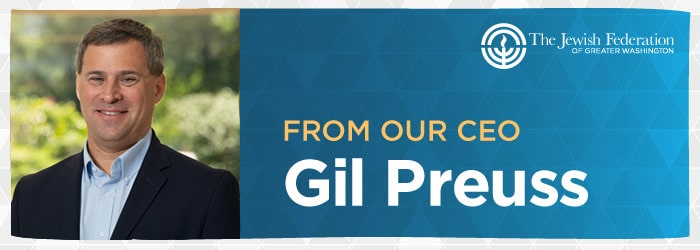-
18 October 2019

On October 27, we will mark one year since the horrifying attack on the congregations at the Tree of Life building in Pittsburgh. It is a moment that will live on in the American Jewish story as both painful and historic. The often-abstract concepts of rising hate and anti-Semitism became all too real that day.
But as many will recall, the worst impulses of humankind also brought out the best in us. Across the country, people of all faiths and backgrounds came together to spread messages of love and hope. I can still recall the palpable sense of unity and resolve that coursed through Greater Washington.
In the days after the attack, thousands of community members gathered to honor the victims and stand united against hate. At the community gathering held at Adas Israel Congregation, even after standing in line for over an hour and not being able to enter the main program due to capacity constraints, almost 2,000 people stood outside, joining the 3,000 inside, to remember and honor those who were killed. They wanted to be there, in the company of others.
During times of tragedy, the pull of community is strong. It is natural for people to want to come together and be there for each other. We feel compelled to gather and to go out of our way to make sure others are okay. When the dust settles, however, it is also in our nature to return to our routines, to get caught up in the demands of everyday life, and to lose that special feeling of connection and belonging.
At The Jewish Federation of Greater Washington, we want to disrupt this cycle. While it is essential to come together as a community in times of crisis, it is equally essential that we be there for each other in life’s quieter moments, too. We want to strengthen and sustain a sense of connection that will help us navigate whatever comes our way.
Memory plays an important role in this work. As Avraham Infeld likes to describe, Jewish memory is even more important than Jewish history. Part of the power of Jewish identity comes from the sense that we are links in an unbroken chain. And so, as we look ahead to what’s next, I am wondering how we can best sustain the bonds we share not only with our heritage but with each other. How do we resist fracturing? How do we use the memory of what the Jewish people have faced and achieved to build a strong and vibrant future?
I do not expect that these questions come with easy answers. But I am also confident that no matter the challenge, the best path forward is one that leads toward each other. It is up to each of us to come together, stand together, and work together in pursuit of the strong, secure community we seek. For as many threats as the Jewish people face, we have the opportunity and the responsibility of determining our own path forward.
To start, I invite you to join us as we Pause with Pittsburgh on October 27. Designed in the spirit of Israel’s Yom HaZikaron (Memorial Day) commemorations during which the whole country physically stops to remember those killed in its wars, Federation is joining with hundreds of other communities to inspire our global Jewish community to pause and share a moment of reflection and remembrance. Register here to receive a text message at 5:00 pm EST on October 27—the same moment the Pittsburgh community will join in a public memorial service.
This communal pause is an opportunity to reflect and honor the memory of those we lost. It is also a chance tap back into our sense of solidarity and bring it forward into the future.
Shabbat Shalom,
Gil
